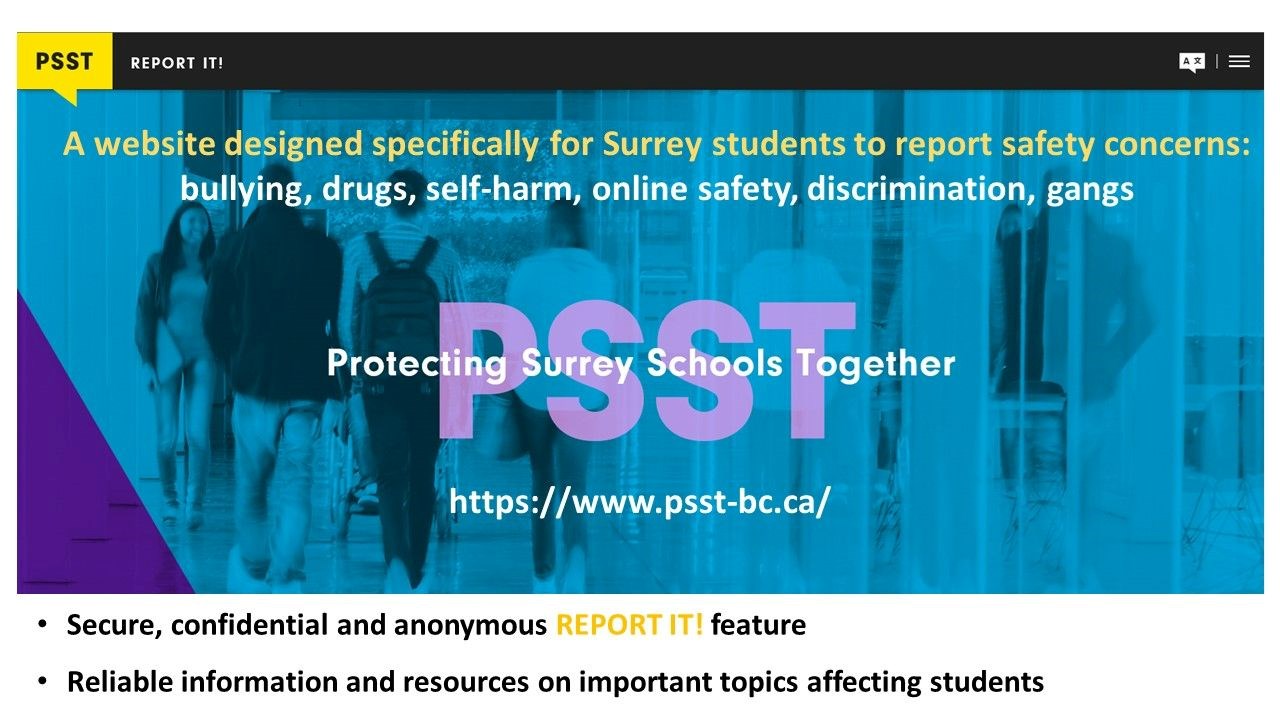Know the signs of gang involvement in youth
 psst-bc.caWith students returning to school, Surrey Schools reminds families about the district’s supports, resources and anti-gang programs, as well what to watch for if you suspect your child might be involved in questionable or unsafe activity.
psst-bc.caWith students returning to school, Surrey Schools reminds families about the district’s supports, resources and anti-gang programs, as well what to watch for if you suspect your child might be involved in questionable or unsafe activity.
The district’s Safe Schools department works to prevent gang involvement and provides a number of programs for youth, including PSST (Protecting Surrey Schools Together), Code Blue and Wraparound. The district takes a community approach to anti-gang supports that involves educators, counsellors, administrators, Surrey RCMP members and community outreach workers. We also have Safe Schools Liaisons at each of our 21 secondary schools.
How to Tell if Your Teen is in a Gang
Youth of all ages and from all backgrounds can get drawn into gang life, so it’s important to know the warning signs for kids and teens who may be in a gang or considering joining one.
There are some common signs parents can watch for to prevent their kids from joining a gang or stop their involvement early on, starting with concerning shifts in behaviour. These can include:
- Grades and attendance dropping at school
- Relationships with parents deteriorating
- Extreme changes in attitude
- Staying out late with new friends
- A newfound sense of secrecy
- Acquiring possessions that parents didn’t pay for
- A new job with no proof of employment (i.e. no paycheque, etc.)
“If a teen says he’s gotten a new job and is gone for hours on end, but has no proof like a paystub, that could indicate illicit activity,” said Rob Rai, director of School & Community Connections with Safe Schools.
While it’s important to know the signs of gang activity, it’s just as important to know how to talk to your teen about gangs. Rai said gang prevention starts at home, and maintaining a loving, communicative relationship with your teen is key to keeping them safe and out of trouble.
“Children who have healthy relationships with the primary adults in their lives tend not to look for belonging and acceptance with negative peer groups and gangs,” he said. “It’s important to have an honest, open and trusting relationship with your teen and make time to ask caring questions to know what they’re up to.”
Rai said parents must make an effort to be part of their children’s life by checking in on a daily basis, taking an interest in their lives and being aware of who their friends are, how they’re doing in school and how they’re doing socially, in person and on social media.
“If you have a healthy, resilient relationship with your child, as parents or as a single parent, your kids are going to do well,” he said.
Anti-Gang Resources
In addition to Safe Schools’ many programs, Rai recommends parents also check out other comprehensive resources, such as the Combined Forces Special Enforcement Unit of BC (CFSEU) End Gang Life website. The site offers pages to illustrate the myths and realities of gang life, booklets on youth and gangs (in multiple languages), and information on gang exiting and intervention.
The Surrey RCMP Parent Helpline (604-599-7800) assists parents who suspect their child may be involved in illegal activities, and the Surrey RCMP’s Family & Youth Resource Support Team (FYRST) provides early intervention supports to proactively prevent youth in Grades 4-7 from making bad life choices. Other RCMP projects and initiatives include Project Lavender and Shattering the Image.
Noticing the warning signs of gang activity early is far better than trying to stop it after it has begun. If you believe your child is involved in illegal or gang activity, do not hesitate to contact your school to ask for help. There are many community partners who play a role in keeping our kids out of gangs.
For more information on youth gangs and how you can keep your children safe, please visit psst-bc.ca and cfseu.bc.ca/end-gang-life or talk to your school.

